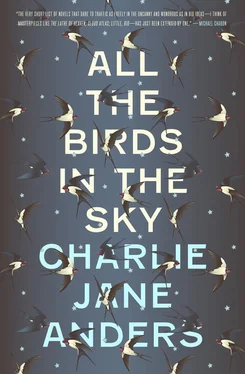And then he ran out of things to say for a second, and that was it, he felt his voice go — not so much like his throat closing up but like the speech centers of his brain dropping dead from a minor stroke, like an awful head rush. He couldn’t even verbalize in his mind, which he had to admit was a clever way to do it, since there would be no easy workaround even with brain implants. He couldn’t believe his last words on Earth were going to be “she’s my rocket ship.” Jesus.
Isobel was half-recoiling, half-embracing him, and her grip slackened enough on the gun for him to pull it from her hand and throw it away.
Then an elderly woman appeared out of the noxious smoke behind them. She was in her sixties or seventies, wearing an immaculate white pantsuit with a paisley print silk scarf and a turquoise brooch. She touched Isobel, who fell asleep on the ground. Then she bent over Patricia and ran the back of her hand over Patricia’s seared forehead, as if checking a child’s temperature. Patricia woke up, none the worse for wear.
“Carmen.” Patricia sat up and looked around at the aftermath, the bodies, the open flames, the rubble. “I’m so sorry, Carmen. I’m sorry. I should have … I don’t know what. But I’m sorry.”
“Not your fault,” the old lady — Carmen — said. She glanced at Laurence, who said nothing, of course. “None of this is. I got here as fast as I could. I’m terribly sorry about Ernesto and the others. Ernesto was my friend for over forty years, and I will never forget … Anyway, it doesn’t matter now.” She reached out her hand and helped Patricia to her feet. Laurence stood up, too.
“I can’t find Ernesto at all,” Patricia said. “I rescued someone else from that other universe, once. But Ernesto’s just … gone.”
“He’s already lost to us,” Carmen said. “Like so many others, today.”
“How bad is it?” Patricia said, clearly meaning the devastation elsewhere, in all the places Milton’s people had attacked in their coordinated assault.
“Bad,” Carmen said. “Quite bad. They were clever, these ones. But this doesn’t matter. It’s not about us, or all our rules against Aggrandizement mean nothing. This is just what happens. This is what always happens. This is happening everywhere. And it will happen again and again.” She picked up Isobel’s gun and looked at it, then tossed it away. “The hour is coming soon when we may have to act. These sort of things just bring it closer.”
“The Unraveling,” Patricia said. “I wanted to say, the Unraveling is a form of violence, too. And it’s … it’s too soon.”
“It’s always too soon,” Carmen said. “Until it’s too late. In any case, we won’t do anything without deliberating, although Ernesto would have been a voice for caution. And now…” She closed her eyes. “I must go. Prepare for the worst. We’ll talk again soon.”
Carmen wrapped herself in smoke and was gone. Leaving Patricia and Laurence, dumbstruck.
WHEN PATRICIA HAD crammed her fingers into the heart of the killing machine, her vision had whited out and she’d heard sick angels blaring at her, she’d crashed into the sky, and everything blurred into nothing. Carmen’s knuckles brushed Patricia’s head sometime later, and she came back. She felt the euphoria of returning to life, just for a moment, then she remembered that everyone was dead, everything was on fire, and Carmen was saying things like, “The hour is coming soon.”
And now Patricia was rushing, even though there was no place to go. She ran past dark distorted storefronts and naked flames, looters and volunteer firefighters, past people dragging their possessions in the street and two men beating each other with their fists. Part of Patricia felt like she had died, after all. Another part, though, felt like she’d gotten a brand-new life.
Laurence was giving Patricia the silent treatment, and it was creeping her out. Maybe he was pissed, or feeling guilty about his friends killing her friends, or freaking out about the Unraveling. But he refused to talk, no matter how many times she looked over her shoulder at him and told him she was scared or they were screwed, or just to keep up. He just gave her a weird look and some hand gestures.
The birds, meanwhile, would not shut the hell up. They were chorusing, “Too late! Too late!” over and over again, from every cantilevered tree and every sunken roof. They followed, flying right over her and behind her, chirping. “Too late!”
“Shut up!” she shouted in bird language at them. “I know, I screwed everything up. You don’t have to keep rubbing my face in it.”
At the place where Mission and Valencia converge, Patricia seized Laurence by the shoulders. “Look, I know a lot of stuff has happened, most of it today, and you’re just dealing with it in your own fashion. But goddamn it, I need to hear your voice. Right now. I need you to tell me there’s still hope. Lie, I don’t care. Please! Why are you being like this?”
She saw the look of misery and annoyance on Laurence’s face, and then she realized.
“Oh. You didn’t.”
He nodded.
“You stupid dumbass. What were you thinking? Why would you do that?” She was shaking his whole torso, with all her strength.
He finally slipped out of her grasp, got his Caddy out, and typed. “Saved yr life. Isobel was going to shoot u. She wanted/deserved an explanation.” His face was a different shape without words constantly coming out of it. Like his eyes were bigger and his mouth smaller.
“You…” She started to say “you stupid dumbass” again, but it turned into: “You gave up your voice for me.”
Laurence nodded.
She put her arms around him, tight enough to feel him breathing. Lungs inflating and deflating, no sound but airflow. She couldn’t make herself grasp that he had done this on purpose. For her. Nothing magical had ever confounded her so much.
A pigeon landed on her shoulder. “Too late!” it burbled in her ear.
Fucking interrupting pigeon. “Why is it too late?” she asked.
“Too late,” was all it said in response.
“It can’t be too late,” Patricia said, “or you wouldn’t be talking to me.”
Laurence looked at the pigeon on Patricia’s shoulder, pecking at the air and babbling, and his eyes narrowed like he really wanted to say something snarky.
“Almost too late,” the pigeon said. “Practically too late.”
She tried to ask, again, why it was too late, but the bird flew off — although maybe like it wanted her to follow. In any case, nothing would be worse than standing in front of the shuttered Bench Bar obsessing about everyone who had been silenced, one way or another. “We need to follow that bird,” she told Laurence, who shrugged, like why not? So we’re following a bird now .
She took off up the hill, away from Mission, keeping the pigeon in sight as it kept wheeling and then soaring uphill again. The pigeon led them up a tiny staircase, set in the hillside, and then to a tiny lane that zigzagged through trees. The street got smaller and smaller until it was just a pathway through a terrace clogged with willows and banyans, big low-slung branches putting their leaves in her face as she raced to keep the pigeon’s messy wings in sight.
The pigeon banked and went up another tiny outdoor staircase, rising into darkness. The trees collided over the stairs, their branches packed so tight Patricia kept losing sight of the bird they were chasing. She grabbed Laurence’s hand as the staircase turned into a loose dirt slope going upwards, and the trees became wider and even tighter-packed. Bark thick as tire treads, branches like barbed wire. They masked the sky. She spent all her concentration steering Laurence and herself on a clear path. The slope grew steeper and steeper until it was vertical, and then it flattened. Patricia glanced behind her and couldn’t even see the path they’d come from.
Читать дальше












